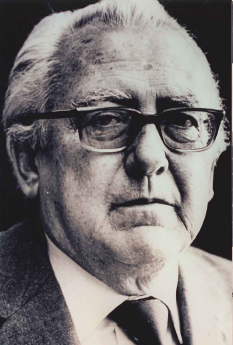
December 17, 1986
Case: Guillermo Cano Isaza
|
Launching of Guillermo Cano university chair among activities marking 20th anniversary of "El Espectador" editor's murder, still unpunished:
December 15, 2006
Impunity Project
Twenty years later, Guillermo Cano's murder is still unpunished
Bogota (December 15, 2006).0 On 17 December 2006, it will be 20 years since the death of "El Espectador" editor Guillermo Cano Isaza, murdered in Bogotá by drug trafficking cartels.
Cano Isaza was born in Medellín in 1925, and was a journalist for over four decades. At the age of 17 he began writing for the Bogotá daily "El Espectador", now a weekly. He later became the newspaper's director, a position he held until his death. He was a respected opinion-maker among Colombian journalists, and a staunch critic of the country's principal problems, such as corruption, drug trafficking and human rights violations.
Consistent with this, he was a persistent defender of press freedom. He won several national and international prizes. Under his leadership, "El Espectador" tirelessly criticised the Medellín and Cali drug cartels, openly supporting their members' extradition to the United States, which was to cost him his life. On 17 December 1986, at 7:00 p.m. (local time), after leaving the newspaper's facilities, two hired assassins on a motorcycle shot him and fled.
His murder was the first volley in an onslaught against "El Espectador" by the Medellín cartel, led by Pablo Escobar Gaviria. Some of the newspaper's other journalists and administrative staff were also murdered; others had to go into exile after receiving death threats. On 2 September 1989, the newspaper's headquarters were partially destroyed by a car bomb, as was another of its facilities in the capital.
Extreme pressure was brought to bear on the investigation into Cano's murder, with resulting irregularities. At a time when investigations by anonymous judges using testimony from anonymous witnesses was an option, instead their names were publicly revealed, so that they could be bribed, threatened or murdered. Only one of the material perpetrators of the murder, Luis Carlos Molina Yepes, ever went to prison. He was released after six years.
The Guillermo Cano Isaza Foundation (La Fundación Guillermo Cano Isaza) will hold a series of activities commemorating the life and work of this distinguished journalist, beginning on 18 December. UNESCO will be awarding the Guillermo Cano World Press Freedom Award for 2007. The Foundation will also issue a report on press freedom during the last 20 years, and launch the Guillermo Cano chair, supported by several journalism faculties of universities in the Antioquia department. Foundation director Marisol Cano Busquets, Guillermo Cano's niece, told FLIP that these activities are aimed at "reaffirming the kind of journalism the Guillermo Cano engaged in - independent, free and with clear ideas - for new generations of journalists."
|